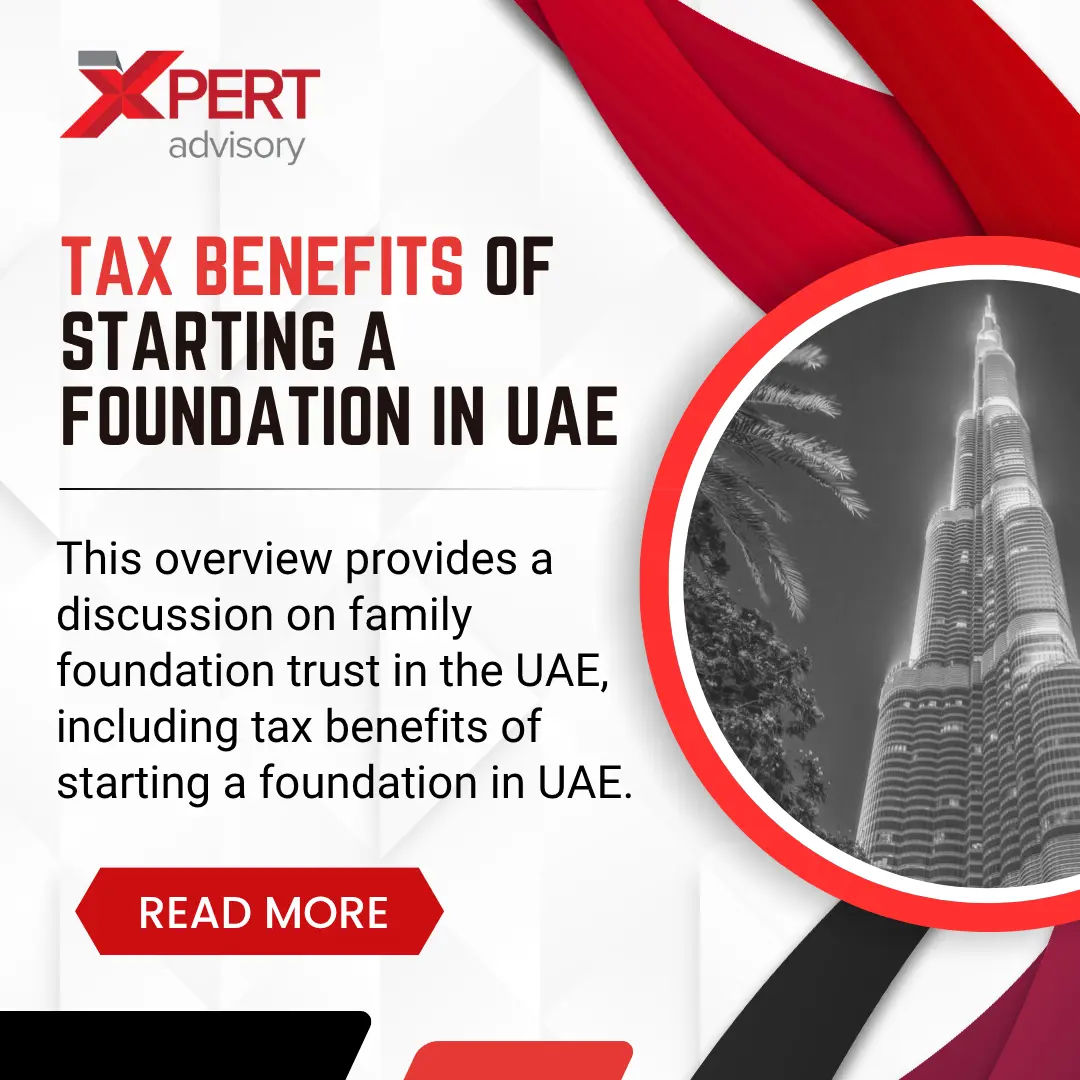Setting up a foundation in the UAE has some unique possibilities for you, which could include tax benefits, a way to manage your assets, and a way to partner with your family for long-term asset protection.
This overview provides a discussion on family foundation trust in the UAE, including tax benefits of starting a foundation in UAE. Now moving from the broad view, let’s go into the details related to family foundations and taxes.
Understanding Taxation of Foundations in the UAE

The UAE has adopted a modern and innovative approach to family foundations, particularly in addressing issues of fiscal treatment and corporate tax for beneficiaries of a family foundation. By properly structuring a foundation, individuals can fulfil all their compliance obligations while also receiving significant tax benefits in doing so.
Family foundations that do not operate commercially may be exempt from UAE corporate tax, allowing families to shelter their wealth, reinvest it in strategic allocations, and comply with tax obligations without incurring a financial loss.
Further, foundations may in fact be treated as fiscally transparent or unincorporated partnerships that allocate income directly to beneficiaries when distributed. This would avoid issues of double taxation at the foundation level and effectively spread wealth across multiple generations.
Foundations are required to register with the UAE Federal Tax Authority only if they engage in a taxable activity, maintain the documentation, conduct their reporting accurately, and avoid penalties during the relevant tax period.
Foundations must know what tax period is applicable to be compliant so they can accurately conduct reporting and reduce liabilities, including filing on time, and making decisions for tax-effective planning in relation to the distribution of income and management of assets.
Family Foundation Structure and Benefits
A family foundation in the UAE presents the structure, governance, protection, and tax efficiency of a trust, while providing a much higher level of governance and control over family wealth than a trust.
Benefits that a family foundation can offer include tax avoidance strategies and effective asset management.
- Managed as a Family: Family members would be in control of both the family assets and the family foundation. They can be able to take advantage of the familial succession planning, governance and stewardship oversight. One positive or beneficial aspect of managing family office assets across multiple generations is that they can also focus on activities that would enhance their long-term sustainability.
- Fund or Manage Family Assets: Family members would be able to grow, invest, or donate family foundation money to manage assets. Charitable giving goals and then careful planning to manage the legacy of wealth to the next generation while gaining tax efficiencies.
- Public Benefit Opportunity: A foundation that takes on a public benefit that can qualify, allows the family foundation to receive the tax benefits to deliver against the donation of the charitable dollars. It helps support the project, increase public reputation, enhance cash flows, and ensure compliance with corporate tax laws in the UAE.
- Tax Planning: It is essential to structure the foundation in a way that reduces liability to corporate tax while complying with the UAE’s corporate tax laws. Then double the family business goals or family financial goals with their tax planning strategies, while utilising any incentives/taxation programs that the UAE government offers.
Tax Treatment of Family Foundations
Typically, family foundations in the UAE are subject to different tax regimes depending on their activity.
- Corporate Tax Purpose: A foundation may be subject to corporate tax if commercial activity takes place. Careful planning and structuring can ensure that only tax-relevant income will be taxed, and the overall position of the family foundation can be optimised.
- Transparent Entities: A lot of family foundations are regarded as transparent entities, and the income is transferred to the beneficiaries directly. This will avoid double taxation at the foundation level and enable direct benefits to beneficiaries, as well as reduced reporting requirements for both the foundation and its beneficiaries.
- International Tax Compliance: For families with cross-border investments, it is essential to have an understanding of international tax treaties to avoid tax liabilities and operate within the law, and also invest tax efficiently in jurisdictions outside of the UAE.
Qualifying for Tax Benefits
In order to initially comply with the taxation of family foundations, they must qualify for tax benefits within the UAE’s rules and regulations. Requirements:
- Foundation: It ensures compliance with UAE law and has proper governance. A compliant foundation protects the legal status of the foundation, opens it to benefit under fiscally beneficial structures and maintains legal status during any transactions or distributions.
- FTA Adherence: Register and report to the FTA if it partakes in a taxable person business. Proper and timely registration means money saved from tax exemptions, no penalties and adherence to the transparency and reporting required by the federal body.
- Public Benefit Entities: If the family foundation is conducting activities for public benefit, it may qualify for additional tax benefits of starting a foundation in UAE. Family foundations are often favourably treated in terms of tax legislation when supporting positive social outcomes, education, healthcare or social welfare.
- Legal Documents: When establishing a foundation or trust, it is vital to understand what is legally being recognised and what tax status is being assumed. Legal documents will contain provisions to protect the foundation’s assets, govern or otherwise administer the foundation and provide opportunities to undertake tax planning that will work in all jurisdictions.
DIFC and Abu Dhabi Global Market Considerations
Family foundations set up in the United Arab Emirates Dubai International Financial Centre (DIFC) or Abu Dhabi Global Market (ADGM) are assured to enjoy some unique features under the UAE corporate tax law.
- Tax Treatment of Family Foundations: Family foundations set up in either DIFC or ADGM locations can expect to enjoy a high level of tax transparency. Income can be distributed effectively to beneficiaries without incurring high corporate tax exposure, and to provide effective administration of the foundation’s affairs.
- Recognition as Separate Legal Entities: Both jurisdictions recognise foundations as separate legal entities under UAE corporate tax law. Clarity of governance, compliance, and a practical framework for international finance, provided by the recognition as an independent legal entity, are available to family foundations.
- International Tax Compliance: Foundations located in free zones can also take advantage of the UAE’s treaty networks to ensure tax-efficient cross-border transactions to safeguard family assets and reduce exposure to foreign taxation.
Tax Planning and Obligations

The art of tax planning is significant because compliance and the ability to use the benefits of establishing a family foundation are also essential.
- Corporate Tax Liability: Foundations should evaluate their possible corporate taxable activities to minimise corporate tax. As part of this planning process, the Foundation can ensure that only relevant income is taxable and will allow for investable profits by the family.
- Tax Residency: The place of residency matters because of the country’s taxation laws and the ability to access international treaties. If residency is planned strategically, the family will benefit from tax efficiencies in the UAE and have access to cross-border wealth management opportunities.
- Tax Guide Compliance: If the Foundation follows the FTA guidance, the Foundation will make accurate reports and learn the penalties if not compliant. These guidelines help the Foundation maintain good standing with tax authorities and can be helpful to beneficiaries in promoting transparency.
- Scope of UAE: The UAE corporate tax will be limited to activities within the UAE and any income that is sourced from the UAE. An understanding of scope helps Foundations still plan for investments while assuring compliance and planning for optimal tax treatment.
Conclusion
Families that want to protect family wealth, manage their corporations’ tax planning, and maintain visibility in governance can benefit significantly from the tax benefits of starting a foundation in UAE. By understanding family foundations and their taxation, managing UAE corporate tax compliance, utilising the appropriate jurisdiction of either DIFC or ADGM families can develop a strategy for managing their wealth to minimise tax payments.
Setting up a family foundation in the UAE will help provide asset protection for the family, but it also offers significant future tax planning possibilities.
To obtain customised advice on the implementation of a family foundation in the UAE that also addresses tax succession planning advice, please speak to Xpert Advisory‘s specialist consultants today! Start now to secure your family’s wealth through a compliant and tax-planning family foundation in the UAE.
FAQ
1. What Are The Tax Advantages Of Using A Family Foundation In UAE?
A family foundation must be fiscally transparent, letting income flow to beneficiaries and limiting corporate tax on non-commercial activities, helpful for wealth preservation and asset allocation.
2. Can A Family Foundation Carry On Business Activity In UAE?
Yes, family foundation may carry business activities but commercial activities are taxed. Proper structuring and planning are needed to protect assets and minimize tax.
3. How Does DIFC Or ADGM Relate To The Tax Treatment Of Foundations?
Foundations are distinct from the natural person who establishes them These are separate legal entities with fiscal transparency, access to tax treaties, and favorable corporate tax treatment ideal for global wealth planning.


